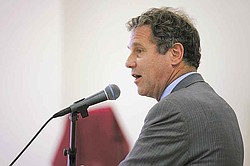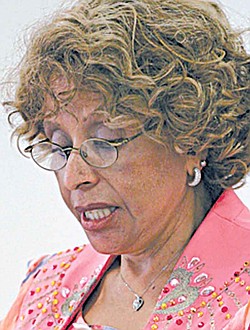Potential program cuts for seniors, disabled blasted at forum
Two-year-old Jordan Jackson of Youngstown wears his “Hands off Social Security” sticker as he waits for Sunday’s town-hall meeting at the Union Baptist Church in Youngstown to begin. The meeting discussed the impact of possible cuts to Social Security, Medicare and Medicaid.
U.S. Sen. Sherrod Brown speaks to community members during Sunday’s town-hall meeting at the Union Baptist Church in Youngstown. The meeting discussed the impact of possible cuts to Social Security, Medicare and Medicaid.
IMPACT OF CUTS
The Mahoning Valley Organizing Collaborative presented this information on social programs and the impact of cuts:
Roughly one in six Ohioans are covered by Social Security, which is keeping about 47,000 children out of poverty.
Cuts to Social Security will lead to a financial burden on many Ohio residents and could cause the poverty rate for the elderly to skyrocket from 8 percent to more than 46 percent.
Limiting Medicaid benefits will throw into poverty a large percentage of elderly people and those with disabilities who are struggling to make ends meet.
By Sean Barron
YOUNGSTOWN
More than $150,000 was spent recently on a traffic light in upstate New York, and government funding was used for a cotton mill in Brazil.
Those are two of what Carolyn Williams says are many examples of wasteful government spending that could be better used to preserve and protect Social Security.
“Social Security is not an entitlement; it is a promise to the American people who have paid into the system,” Williams, of Youngstown, told an audience of about 200 community organizers, senior citizens, residents, elected officials and others who attended Sunday’s town-hall meeting with U.S. Sen. Sherrod Brown at United Baptist Church, 528 Lincoln Ave.
“Proposed cuts will force recipients to pay higher insurance premiums and co-pays, and deny us money for essentials like prescription drugs and groceries.”
Other elected officials who spoke were U.S. Rep. Tim Ryan of Niles, D-17th, and state Sen. Capri Cafaro of Liberty.
Sponsoring the 90-minute gathering were the Mahoning Valley Organizing Collaborative in partnership with the Service Employees International Union’s Fight for a Fair Economy Campaign, the Ohio Organizing Collaborative and Union Baptist.
Williams, an MVOC member, recalled being forced to take early retirement because of an injury after having worked 24 years as an X-ray technician. She also was one of several people who offered personal testimonies and spoke against cuts to the programs.
Another speaker was Virginia Wepfer of Lake Milton, who worked 56 years as a nurse before suffering a back injury in 2003 that required about six months of physical therapy.
In addition, Wepfer’s husband, Gordon, suffered a fall last year that tore a muscle in his right shoulder, resulting in roughly two months of such therapy.
Nevertheless, Gordon Wepfer is able to raise both arms and his wife walks much better, thanks to the necessary treatments that were paid for largely by Medicare, Virginia Wepfer explained.
“You can judge a society by the way it treats its most vulnerable members,” she added.
Gloria Hobbs of Youngstown is on Social Security and receives Medicaid to supplement her Medicare coverage. All three are necessary for Hobbs to take care of herself, she said.
“These programs are not a matter of entitlement; they are a matter of survival for our seniors,” she continued. “These sweeping changes will overwhelm an already distressed population.”
Brown, a Democrat from Avon, compared attacks on the three programs to mounted opposition, largely by powerful interests, to Social Security and Medicare in the 1930s and 1960s, respectively.
For example, many members of the conservative John Birch Society were angered over the passage of Medicare in 1965, Brown noted. Attempts to privatize or otherwise negatively alter Social Security, Medicare and Medicaid will fail if people collaborate with one another and keep fighting for the programs, the senator said.
Many people in their 50s without health-care coverage put off necessary medical procedures until they’re eligible for Medicare. By then, however, their problems are chronic and much more costly, which contributes to driving up health-care costs, Ryan explained, adding that the last 30 years have seen a huge shift of wealth from the middle class to the top 1 percent of wage earners.
Brown, Ryan and Cafaro took questions that included how the country can continue to fund domestic programs while being embroiled in two wars, and why many Republicans seem unable to work with President Barack Obama on many issues.
Brown denounced some members of Congress who advocate raising the retirement age, and Cafaro talked about how she feels the elimination of Ohio’s estate tax could damage many communities.
Moderating the gathering was the Rev. Solomon Hill, pastor of Centinary United Methodist Church in Youngstown.
 43
43



